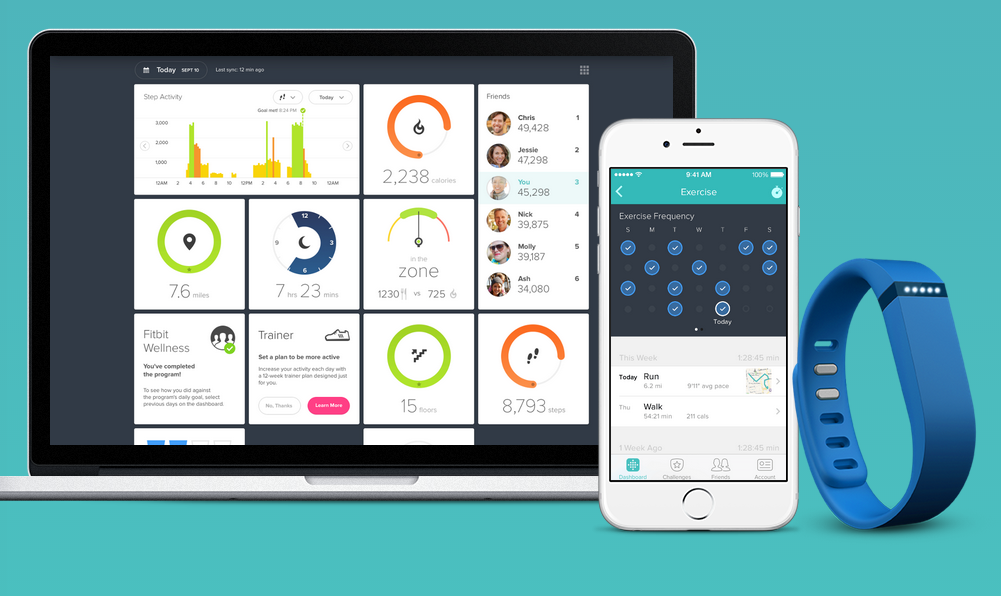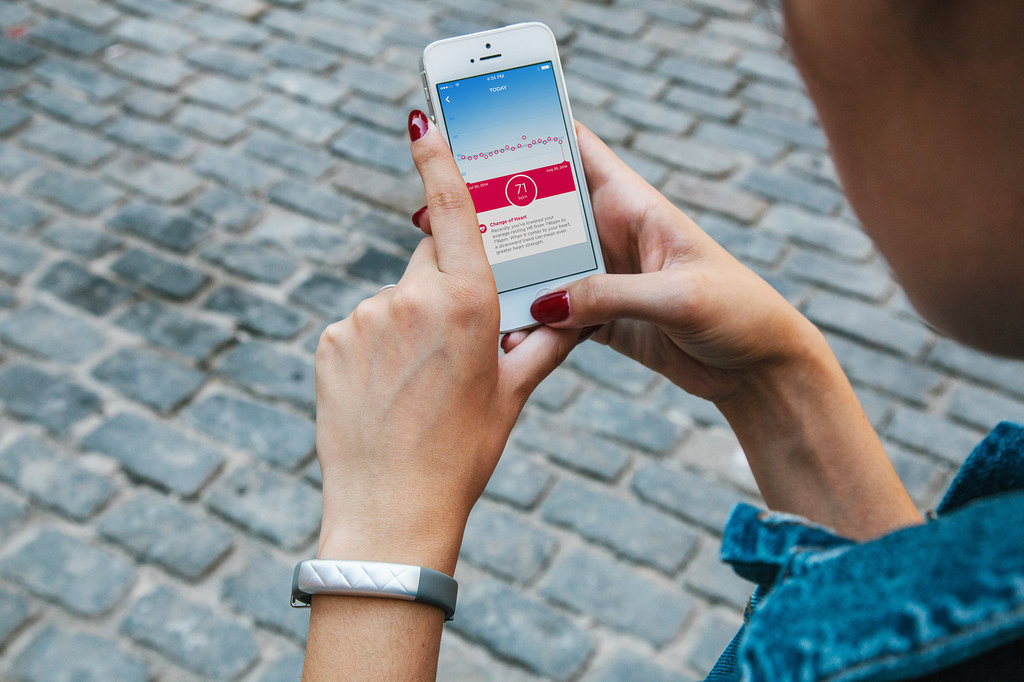
Jawbone is suing Fitbit for infringing on its patented wearable technology. It's bad news for Fitbit, the biggest activity-tracker maker in the world — but if Jawbone wins, it will also mean trouble for Apple, Samsung, and basically any other wearable company that attempts to track movement and equate it to health.
Last week, Jawbone sued Fitbit for infringing on patented technologies that broadly use sensors to detect, collect, and interpret data about users' health and fitness biometrics. In Jawbone's reckoning, those functions sound uncannily similar to "virtually all of Fitbit's wearable technology line."
But here's the bigger issue: Jawbone's patents also have a lot in common with other body-monitoring trackers, like the Apple Watch, and the various Android Wear smartwatches from companies like Samsung and Motorola. If Jawbone's lawsuit and patents stand, these larger rivals would make for natural targets — especially given Jawbone's recent spate of financial difficulties.
For example, Jawbone cites in its lawsuit a patented technology that takes data from "one or more sensors disposed in a wearable computing device" and sets a "target score" that's "based on one or more health-related activities," such as a goal for steps or sleep.
That description will sound familiar to people who use their Apple Watches to set daily goals for exercising, calorie burning, and standing. Or to owners of Android Wear watches that show progress toward daily step goals. Or to customers that set targets for their steps, sleep, and calories with Garmin smartwatches and activity trackers.
"If I own those patents, I would litigate," said Chris Marlett, CEO of MDB Capital Group, an investment banking firm that specializes in intellectual property. "Fitbit's certainly doing it. So is anybody that's measuring steps or anybody that's inputting heart rate or doing anything to try and give feedback to the user to do more of it or do less of it. Anybody that wants to enter the space will infringe that patent."

Two other Jawbone-patented technologies also sound an awful lot like other devices. One involves using data from worn sensors to deduce a user's physiological status and context, such as location; the other involves continuously monitoring a user's consumed and burned calories. Jawbone paid more than $100 million to acquire these patents as part of BodyMedia, a wearable technology company, in April 2013.
Sid Leach, a partner at the law firm Snell & Wilmer, predicts that this lawsuit means trouble for others in the space. "It could even impact the Apple Watch," he said, citing the number of Jawbone's patents and the competitive nature of the wearables market.
If Jawbone's patents hold up, they would be ammunition against the Apple Watch — which, with Apple's clout and capital, threatens to swallow both Jawbone and Fitbit's market share.
"If I'm Jawbone," Marlett said, "I want to take down Fitbit first before I go and attack Apple."
If that happens, it wouldn't be the first time a company successfully went after a target and then took on a bigger rival. In 2001, NTP, a Virginia patent holding company, sued Research in Motion, the company behind BlackBerry, for allegedly infringing on its wireless email patents. After NTP won a $612.5 million settlement, it went on from 2007 to 2010 to sue more than a dozen other tech giants, including AT&T, Verizon, Sprint, and T-Mobile, for infringing on those patents, too. (Those lawsuits were settled in 2012.)
Jawbone and Google declined to comment for this story, and Apple did not return a request for comment.

The intellectual property at stake is positioned to become extremely valuable as wearables turn into one of the fastest-growing sectors in consumer technology. Technology companies in general are accustomed to patent litigation: There are hundreds of thousands of active software patents that are virtually impossible to avoid stepping on. The industry's heavyweights have sued each other in the United States and elsewhere for infringing on their patents, and so-called patent trolls don't actually use their thick portfolio of patents other than to turn a profit from such lawsuits.
"Pretty much any time you have a very popular, very lucrative technology, patent suits are going to result," Brian Love, co-director of the High Tech Law Institute at Santa Clara University School of Law, told BuzzFeed News.
"The reason there were so many lawsuits involving smartphones is that smartphones aggregate such a diverse amount of technology into one product," Love said. He cited Apple's lawsuit against Samsung Electronics for copying the iPhone's design, a contentious case that ultimately awarded Apple damages of less than $930 million. "There are patent holders in lots and lots of different industries who would be interested in getting a bite of the action."
Similarly, he said, wearables pack in lots of technologies, like sensors that detect motion and heart rate and user interface designs. "In all likelihood, there's thousands, if not tens of thousands, of patents that read on some particular aspect of a device," Love said.

Jawbone is on the attack as Fitbit seeks to become the first stand-alone wearable company to go public Thursday and raise as much as $655 million for it and its shareholders. Founded in 2007, Fitbit sold nearly 11 million devices and generated $745 million last year. It captured 85% of the United States' wireless activity-tracker market in the first quarter of this year alone, according to the NPD Group, a market analysis firm.
That success puts Jawbone on the defensive. It started before Fitbit did — in 1999, when it was known as Aliph — and initially sold wireless headsets before adding activity-tracking bracelets in 2011. Despite raising $700 million and being valued at $3 billion, the privately held company is reportedly struggling to raise funding and pay off debts. Its issues with Fitbit are manifold: In another recent lawsuit, Fitbit was accused of systematically poaching Jawbone employees and trade secrets about products and finances.
Fitbit disputes Jawbone's claims. "Fitbit has independently developed and delivered innovative product offerings to empower its customers to lead healthier, more active lives," a spokesperson told BuzzFeed News last week.
Fitbit says it has more than 200 granted and pending patents. (A search of the U.S. Patent and Trademark Office turns up about 100 patents granted from 2012 onward.) Meanwhile, Jawbone, including BodyMedia, claims to have "hundreds" of granted and pending patents (about 150 granted patents going back to 2001 show up online).
However Jawbone v. Fitbit plays out, it almost certainly won't be the last time two wearable makers lawyer up against each other.
